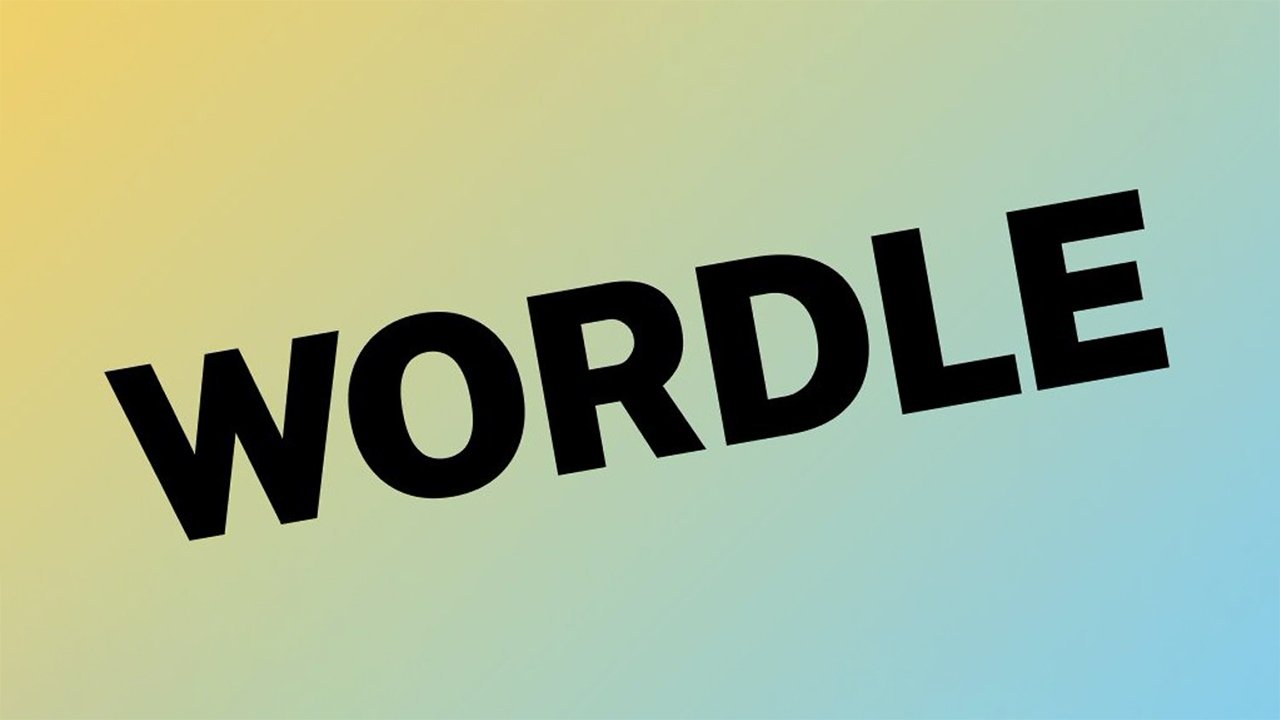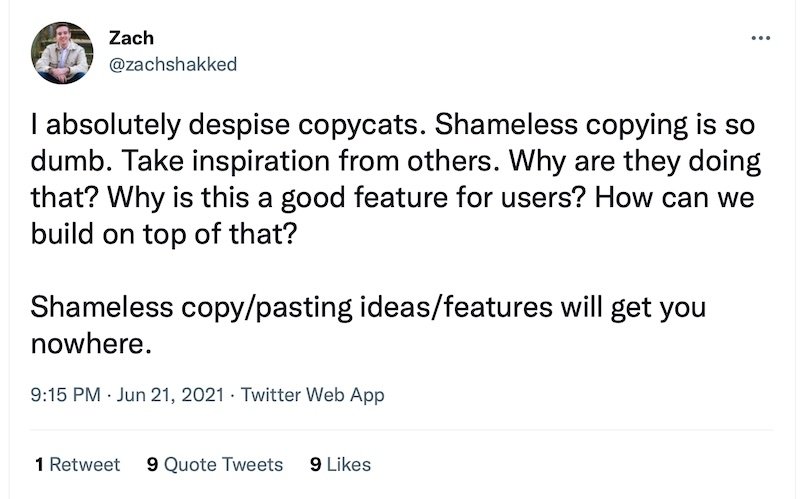'Wordle' clones further illustrate the curation problem in the App Store
Clones of popular word-guessing game "Wordle" are flooding the App Store, including one that steals the name and hijacks the intent of the original with in-app subscriptions. It's in Apple's best interest to take them down.

The Twitter banner for the iOS "Wordle" clone
Zach Shakked is the developer of "Wordle -- The App," a word-guessing game on the App Store. The problem is that the App Store version is a blatant ripoff of the actual Wordle, which was created by Josh Wardle and only exists as a browser-based game.
More than that, the original Wordle is completely free -- with the caveat that players only have one chance to guess the word of the day. Shakked's App Store clone, on the other hand, charges users $30 a month for "unlimited guessing."
Copy-cats and ripoffs aren't uncommon, as trademarks and copyrights on mechanics and concepts are hard and expensive to obtain. Even the original Wordle builds on a foundation set by prior games like Lingo.
However, Shakked's clone is more egregious because it shamelessly steals everything about Wordle, even its name -- a pun on the original developer's surname, Wardle. It also charges money for a concept that Wardle has promised will remain ad-free and simple.
Shakked also managed to court controversy because he was shamelessly bragging about the number of downloads his clone was seeing. By last count, the ripoff version on the App Store has amassed tens of thousands of downloads.
All of this is also coming from a person who, in June 2021, said he "absolutely despise[s] copycats."

A 2021 tweet from the developer of the "Wordle" clone.
Wardle, the original developer of "Wordle," doesn't appear to own the copyright to the name. However, while the clone may not be technically illegal, it is in violation of Apple's App Store developer guidelines. And, Apple isn't doing anything about it.
Guideline 4.1, for example, prohibits developers from copying other apps. In fact, it says developers should not "make some minor changes to another app's name or UI and pass it off as [their] own." Shakked, for his part, didn't even bother to change the name.
In other words, Apple has the right to take down the copycat "Wordle" app. And, it should.
Fairness aside, Apple has also taken flack for allegedly allowing scam and copycat apps to run amok on the App Store. It has argued that the rate of blatant clones is fairly low, but in the case of a viral hit like "Wordle," it has even more reason to take down the copycat.
As far as consumers and App Store users, you have the choice to download the iOS version of "Wordle" and fork over money for a shameless ripoff. Or, you could just play the original "Wordle" for free online.
If you want advice from us, we'd recommend the latter.
Read on AppleInsider

The Twitter banner for the iOS "Wordle" clone
Zach Shakked is the developer of "Wordle -- The App," a word-guessing game on the App Store. The problem is that the App Store version is a blatant ripoff of the actual Wordle, which was created by Josh Wardle and only exists as a browser-based game.
More than that, the original Wordle is completely free -- with the caveat that players only have one chance to guess the word of the day. Shakked's App Store clone, on the other hand, charges users $30 a month for "unlimited guessing."
Copy-cats and ripoffs aren't uncommon, as trademarks and copyrights on mechanics and concepts are hard and expensive to obtain. Even the original Wordle builds on a foundation set by prior games like Lingo.
However, Shakked's clone is more egregious because it shamelessly steals everything about Wordle, even its name -- a pun on the original developer's surname, Wardle. It also charges money for a concept that Wardle has promised will remain ad-free and simple.
Shakked also managed to court controversy because he was shamelessly bragging about the number of downloads his clone was seeing. By last count, the ripoff version on the App Store has amassed tens of thousands of downloads.
All of this is also coming from a person who, in June 2021, said he "absolutely despise[s] copycats."

A 2021 tweet from the developer of the "Wordle" clone.
Wardle, the original developer of "Wordle," doesn't appear to own the copyright to the name. However, while the clone may not be technically illegal, it is in violation of Apple's App Store developer guidelines. And, Apple isn't doing anything about it.
Guideline 4.1, for example, prohibits developers from copying other apps. In fact, it says developers should not "make some minor changes to another app's name or UI and pass it off as [their] own." Shakked, for his part, didn't even bother to change the name.
In other words, Apple has the right to take down the copycat "Wordle" app. And, it should.
Fairness aside, Apple has also taken flack for allegedly allowing scam and copycat apps to run amok on the App Store. It has argued that the rate of blatant clones is fairly low, but in the case of a viral hit like "Wordle," it has even more reason to take down the copycat.
As far as consumers and App Store users, you have the choice to download the iOS version of "Wordle" and fork over money for a shameless ripoff. Or, you could just play the original "Wordle" for free online.
If you want advice from us, we'd recommend the latter.
Read on AppleInsider


Comments
If the original game isn’t in the App Store at all (but just on a free web page) then the no cloning rule has been broken.
As many iOS developers can tell you, apple don’t really listen or care about them, unless you are the size of google.
@mikepeterson, you are confused.
yet Amazon gets a free pass for not only allowing but creating copycat products in theirs.
Cisco got the trademark for "iPhone" when they acquired a small company called Infogear. "iPhone" is a made up "word" by Infogear , which they intended to use as a trademark for an "internet phone", but never did. And yet Cisco had no copyright protection for it, even though the company they acquired was first to come up with the "word", "iPhone".
However, Cisco did register "iPhone" as a trademark. But with trademark laws, a trademark must be tied to a product or service or else one loses it. Cisco never marketed a product or service that used their "iPhone" trademark. One can not sit on a trademark name, even if registered. Otherwise there would be entities registering trademark names, just to sell the license to it later. Like they do with web domains names.
When Apple applied for the "iPhone" trademark, it was granted to Apple because Cisco did not market a product or service using their "iPhone" trademark, in time. One only have so much time to use their trademark for a product or service, in order to keep a trademark. And as long as one uses the trademark for a product or service, they own that trademark forever. Cisco tried to make a mock up of a product and presented a "photoshopped" photo of a box for a phone with "iPhone" on it, at the last moment. But they never marketed and sold such a product and time had expired to use their "iPhone" trademark" for a product or service. Thus they lost their registered trademark for "iPhone".
With trademarks, the "TM" after the name or term, offers no legal protection what-so-ever. It's only an indication that the owner of the product name, intends to register it as a trademark. With trademark, it's first to register (and use it for a product or service), not first to come up with the word or term used for a trademark. There is no automatic trademark, just because one made up the "word" or term, to use as a trademark. And one can not copyright a "word", not even a made up one.